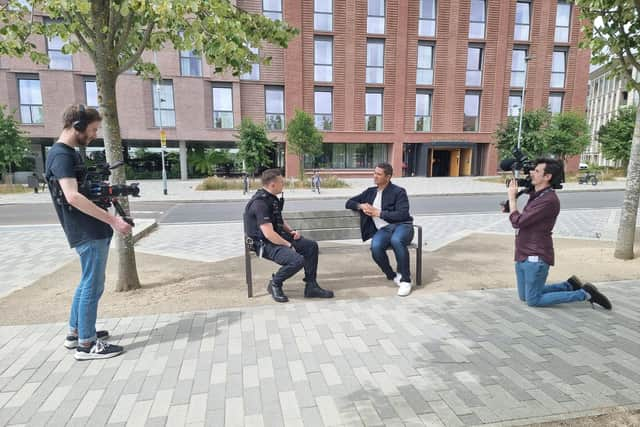Autism no barrier to career in frontline policing says Abbots Langley officer as he appears on BBC TV
and live on Freeview channel 276
A frontline police officer who was recently diagnosed with autism has appeared on morning TV to talk about the condition – and prove it is no barrier to a career in the force.
PC Marcus Zost, who is part of the Abbots Langley Safer Neighbourhood Team, was interviewed by former police officer turned TV presenter Rav Wilding as part of the feature on BBC1’s Morning Live programme, which aired on July 15.
Advertisement
Advertisement
During the interview, Rav questioned Marcus, 30, about his diagnosis and what impact that had on him and his role. He later revealed to Marcus that he too had been screened for the condition and was about to find out whether he also has it.


Although Marcus, who first joined the constabulary when he was just 18 years old as a volunteer Special, was diagnosed as being dyslexic when he was 21 years old, he has only recently been formally diagnosed as autistic.
He is proof that a neurodiverse condition does not prevent you from working for the police or becoming a public-facing frontline officer.
And not only is Marcus now a member of the Safer Neighbourhood Team, but his career has also included working as an emergency call handler in Herts Police’s busy control room, as an Intervention officer responding to 999 emergency calls and also as a plain-clothed officer on targeted operations.
Advertisement
Advertisement
Marcus said: “People aren’t always the same and some of us have hidden disabilities but that is OK and you can be who you want to be.
“When I was officially diagnosed as autistic it made sense to me and explained a few things. I realise now that some of my ‘autistic’ traits have been of benefit to me in policing.
“For example, I was able to identify a pattern in criminal offending that linked two incidents that were thought to be unrelated. I then analysed ANPR (Automatic Number Plate Recognition) data and managed to link a vehicle that present at both locations. I found out that the vehicle was registered in the north and using my knowledge in plate patching, I was able to determine the vehicle was on cloned plates, in turn giving officers information in real time to assist with the incident and make an arrest.”
Marcus also has an excellent ability to remember registration plates. Before going out on patrol officers are given a briefing about any people or vehicles thought to be involved in crime. Marcus can quickly and easily recall the registration numbers, allowing him to stop a vehicle without needing to double check. It means that when out and about on patrol, he can quickly respond.
Advertisement
Advertisement
Marcus added: “I want people to know that having a neurodiverse condition does not exclude you from joining policing.”
Hertfordshire Constabulary welcomes people from all walks of life and we have processes in place including workplace adjustments and support groups to ensure everyone is able to fulfil their role to the best of their ability.
To find out more about the opportunities available within Hertfordshire Constabulary including police officer and staff roles visit the website.
